3-minute read
2023 was a year in which I managed to read and review only 42 books. Yes, there were some really big books, but mostly this has been a year of intensification: reviews are becoming longer and I am taking many more notes while preparing them. A course correction seems in order as I would like to increase that number next year. Another development you might have noticed was several double-reviews, triptychs, and even a quartet. Increasingly often I find that new titles complement earlier books that I have on my shelves, unread. I am keen to learn more, dig deeper, and in the process hopefully provide useful context, so I plan to continue this habit next year.
What follows is my personal top 5 of the most impactful, most beautiful, and most thought-provoking books I read during 2023.
1. Radical by Nature: The Revolutionary Life of Alfred Russel Wallace
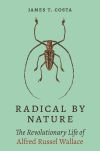 Princeton University Press published some smashing science biographies this year, several of which I still need to get around to, but Radical by Nature was hands down my favourite book of the year. Evolutionary biologist James T. Costa has written an in-depth, tremendously enjoyable, and updated biography that draws on intimate details gleaned from the Wallace Correspondence Project. As I have long wanted to read more about Alfred Russel Wallace, it marked the start of a three-part review. Read more…
Princeton University Press published some smashing science biographies this year, several of which I still need to get around to, but Radical by Nature was hands down my favourite book of the year. Evolutionary biologist James T. Costa has written an in-depth, tremendously enjoyable, and updated biography that draws on intimate details gleaned from the Wallace Correspondence Project. As I have long wanted to read more about Alfred Russel Wallace, it marked the start of a three-part review. Read more…
2. Blue Machine: How the Ocean Shapes Our World
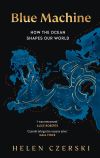 Oceanographer Helen Czerski’s new book, published by Transworld’s non-fiction imprint Torva, has been lauded by the press and it is not hard to see why. An engrossing odyssey into oceanography that oozes lyricism in places, Blue Machine is a captivating book about the liquid engine powering our planet. Read more…
Oceanographer Helen Czerski’s new book, published by Transworld’s non-fiction imprint Torva, has been lauded by the press and it is not hard to see why. An engrossing odyssey into oceanography that oozes lyricism in places, Blue Machine is a captivating book about the liquid engine powering our planet. Read more…
3. The Age of Mammals: Nature, Development, & Paleontology in the Long Nineteenth Century
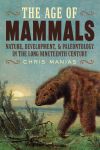 The University of Pittsburgh Press seems to have had a major shake-up of its biology roster as a large number of fascinating titles flowed from the press this year. Chief amongst them was science historian Chris Manias’s book The Age of Mammals. Admittedly a more obscure and academic topic, this wide-ranging and serious intellectual history shows that you cannot understand the history of palaeontology without considering mammals. Read more…
The University of Pittsburgh Press seems to have had a major shake-up of its biology roster as a large number of fascinating titles flowed from the press this year. Chief amongst them was science historian Chris Manias’s book The Age of Mammals. Admittedly a more obscure and academic topic, this wide-ranging and serious intellectual history shows that you cannot understand the history of palaeontology without considering mammals. Read more…
4. The Value of a Whale: On the Illusions of Green Capitalism
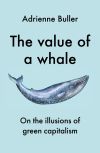 Published last year by Manchester University Press, and part of an expanding list of highly critical books, researcher and analyst Adrienne Buller’s The Value of a Whale is a shocking and necessary corrective to the green capitalist solutions being peddled to address climate change. Read more…
Published last year by Manchester University Press, and part of an expanding list of highly critical books, researcher and analyst Adrienne Buller’s The Value of a Whale is a shocking and necessary corrective to the green capitalist solutions being peddled to address climate change. Read more…
5. Crossings: How Road Ecology Is Shaping the Future of Our Planet
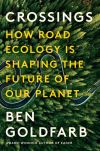 When I learned that environmental journalist Ben Goldfarb had just written a new book, I knew this was going to be good. Published by W.W. Norton during their centenary year, Crossings is a globetrotting, wide-ranging, and eye-opening reportage on the impacts of roads and how ecologists are trying to mitigate them. Read more…
When I learned that environmental journalist Ben Goldfarb had just written a new book, I knew this was going to be good. Published by W.W. Norton during their centenary year, Crossings is a globetrotting, wide-ranging, and eye-opening reportage on the impacts of roads and how ecologists are trying to mitigate them. Read more…
If you are looking for more recommendations, do check out my earlier top 5s. Or browse the archive which lists all reviews where, newly added this year, you will notice separate subject archives and a cover gallery.

Thanks to you, my TBR pile has gotten bigger. And even when I end up deciding that a particular title isn’t for me, I still enjoy reading your reviews.
LikeLiked by 1 person
Thanks! That TBR pile is going to be a focus for me next year…
LikeLike
For goodness sake. Your appetite and accomplishment are voracious. If I could approximate that number of books that challenged my default intellect, I’d be as conceited as hell.
Have a very good New Year and thank you for continuing to be such a superb resource (you might have got this message on your reply template but it told me I had made some form of fatal error!)
Peter
>
LikeLiked by 1 person
Thanks Peter! Stick around for 2024, there is much more in the pipeline ; )
LikeLike
I really enjoy your reviews. Thank you. Are there any books that you read and reviewed a few years ago which stick out to you as being especially impactful or important in hindsight? Books which you feel stuck with you in a special way or shaped how you think over a longer period of time?
LikeLiked by 2 people
Thanks Jacob, glad to hear you enjoy them! Yes, there certainly are some books that have stuck with me. This list became longer than I thought it would…
Some books that have really shaped my outlook on the state of the world
– The Great Acceleration: An Environmental History of the Anthropocene Since 1945 (reviewed in 2021)
– Limits: Why Malthus Was Wrong and Why Environmentalists Should Care (reviewed in 2020)
– Abundant Earth: Toward an Ecological Civilization (reviewed in 2019)
Some books that have really shaped by outlook on our fellow travellers
– Beyond Words: What Animals Think and Feel (reviewed in 2020)
– Mama’s Last Hug: Animal Emotions and What They Teach Us about Ourselves (reviewed in 2019)
Some books that had really powerful narratives
– Islands of Abandonment: Life in the Post-Human Landscape (reviewed in 2021)
– Owls of the Eastern Ice: The Quest to Find and Save the World’s Largest Owl (reviewed in 2020)
– The Outlaw Ocean: Crime and Survival in the Last Untamed Frontier (reviewed in 2019)
– A Wilder Time: Notes from a Geologist at the Edge of the Greenland Ice (reviewed in 2018)
Some darn fine popular science:
– Other Minds: The Octopus and the Evolution of Intelligent Life (reviewed in 2020)
– Who We Are and How We Got Here: Ancient DNA and the New Science of the Human Past (reviewed in 2018)
– Squid Empire: The Rise and Fall of the Cephalopods (reviewed in 2018)
Some evolutionary biology titles that really stuck
– Some Assembly Required: Decoding Four Billion Years of Life, from Ancient Fossils to DNA (reviewed in 2020)
– Contingency and Convergence: Toward a Cosmic Biology of Body and Mind (reviewed in 2020)
– Good Enough: The Tolerance for Mediocrity in Nature and Society (reviewed in 2019)
Finally, one I-can’t-believe-they-made-this-but-I’m-so-happy-they-did book:
– Terrestrial Impact Structures: The TanDEM-X Atlas (2-Volume Set, reviewed in 2020)
LikeLike